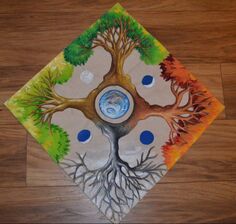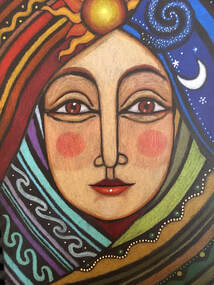|
I want to say a few things now that Saint Patrick's Day is over. I know a fair few people who buy into a revisionist idea of Irish history that I simply can't buy. I've been interested in Celtic lore for more than 40 years. I've studied the history of medieval Wales in some detail, which requires looking at the same time periods and earlier in other parts of Britain and Ireland. And I've also been studying the history of medieval Europe for 25 years. I have a degree in art history as well as 3 years of graduate studies, and art history, like history, is a discipline that takes time to learn and develop.
There's a reason why it takes 4 years to get a degree in history or art history. And those who teach and write in these fields academically have their work reviewed and critiqued by their peers. This system is not perfect, but it means that an academic can't just make stuff up because they feel like it. How a historian makes use of resources is subject to review, so it isn't just about facts, it's about understanding what evidence is and how it works, and what's a reasonable way of finding out what you need to know and of supporting the argument you're making. Or, to put it another way, in a phrase I often mutter and may put on a T-shirt or a placard, "you can't just make shit up." So, no, Patrick was not some genocidal goon who brought death squads to Ireland to force people to convert. He is not analogous to Christopher Columbus or the first colonizers of the Americas. And I'm saying this based on centuries of research and evidence that has been pondered and reflected upon by many generations of scholars and thinkers, and decades of my own research. Patrick is the most famous missionary to Ireland, but he wasn't the only or even the first. We know that a man named Palladius was sent to Ireland in 431 by Rome to act as bishop, which means there were already active Christians in Ireland by then. We don't know for sure when Patrick was there, and many scholars believe the dates for Patrick have been deliberately skewed or obscured to give him more credit and reduce the impact of Palladius. And there may have been more than one person who was later combined to create one historical figure we call Patrick. Which all sounds terribly obscure and you've probably never heard of Palladius and have no interest in the politics of the early church, but that's how complex this history is and how much we need to resist turning this into a bumpersticker version of history. In the fifth century there was no monolithic power structure called "The Church" that systematically imposed its will by force on anybody, especially at the far western fringes of the world as they knew it. The Bible hadn't even been finalized by that time, and the Roman empire was barely even Christian. Christianity was persecuted on and off from 64 AD until 311 AD. Emperor Constantine issued an edict of toleration of all religions in 313, but Christianity was made the official religion of Rome only in 380 AD and it was not a smooth process that happened overnight in any part of the empire. The western part of the empire was in ruins. The Roman Legions were completely withdrawn from Britain in 410 AD, after 400 years of occupation. Rome itself was attacked repeatedly throughout the fifth century and nearly destroyed by the Vizigoths in 476 AD, after Patrick's time. There were Christians in Britain by the end of the first century, certainly by the second century. Many of the people we call missionaries to Britain and Ireland were not there to convert people but to deal with issues among existing Christians. And everyone who founded a church or went on a mission at this time had no way of asking for advice or support. No faxes from the mother church, no way to text for technical support. They were entirely on their own and often had to make things up as they went along. But we have a fair amount of written evidence as well as archeological remains, and we have writings from pagans at the time as well as from Christian writers, so it's not a case of bias or of things being edited or swept under the rug later by the victors. Christianity did not suddenly spring into existence full-blown as some global superpower. There was no great imperial power here, no vast monolithic church nor a big political and military structure behind it. By the fourth century, the might that was Rome was based in the Byzantine Empire, centred in what is now Istanbul. In Patrick's time, whenever that was, there was no imperial power to speak of in western Europe at all. And to see Christians as some specific unified force opposed to or different from natives of any area in Europe is also an oversimplification. Even though many historians feel the term "Dark Ages" is unjustified, it was not a fun time for Europe. The period from 300 to 700 AD is known as the Age of Migrations, when people from eastern and northern Europe moved south and west, peoples from Central Asia entered Europe, and everything was in flux. There were Angles, Saxons and other Germanic tribes moving quietly into Britain even during Roman rule, but once the Romans left, they began moving in wholesale and eventually even gave England their own name, Angle-land. They were followed by the Vikings, and even this is a tremendous oversimplification of what was a very tumultuous period of history. There may have been peaceful decades and even lifetimes here and there, but history and even DNA tell us that tranquillity was not the norm in most of Europe for most of the past 3000 years or more. For more on what had been going on in Britain and Ireland prior to Patrick's time, I highly recommend books by Ronald Hutton, especially The Pagan Religions of the Ancient British Isles, The Druids or Blood and Mistletoe. There was no simple idyllic golden age that was suddenly and rudely disrupted by Christian missionaries. Christianity and Christian structures like monasticism (largely invented in Ireland) were often a bright light in Europe at a time when it seemed like everything was falling apart. Thomas Cahill's book "How The Irish Saved Civilization" is a good overview of how Irish monks provided structure and learning to a Europe devastated by centuries of Roman rule then the loss of that protection and structure, then by repeated invasions from other people. Monasteries provided structure and models of organization in areas that sometimes had no towns or local structure left, and there were monasteries in many parts of Europe long before there were churches. Christians might be foreign, but they could also be locals, while there were many, many different foreigners invading over many centuries. Saint Patrick was not a case of a foreign power coming in and colonizing by force or coercion, and we need to be careful about falling into revisionist or conspiratist theories of history that don't conform with the facts or the evidence we have. We also need to recognize that no matter how much we might like to sympathize with one historical group over another because it suits our twenty-first century notions of justice or rightness, if you're British or Irish, then you have the blood of Cromwell's men in you, of oppressed labourers and brutal overlords, of Crusaders and merchants, priests and peasants, slaves and slave-owners, of people who lived out their lives quietly and of people who went to war. Whether you like it or not. We can choose how we move forward in our own lives, but we can't edit out the parts of the past we'd like to ignore or pretend never happened. There is no "they" that did this to "us." If you're looking at the history of your own people in any part of Europe, then you are descended from a "them" as well as from whatever "us" you're idealizing. There have been many, many generations between St. Patrick's time and us, and we have no control over who those people were, what they stood for or what they did. Nor over how THEY interpreted their history, which well have been entirely different from how we wish it had been. We only have control over our own lives, our values and what we choose to stand for. Rewriting the past won't change our present or our future. We don't get to choose our ancestors. We don't get to rewrite history to suit the narrative we wish were true.
2 Comments
3/18/2016 04:29:58 pm
brovo and well stated......hugs from this old Irish decendant who not just wears Green but Orange as well on the 17th of March...
Reply
Leave a Reply. |
JoAnn TurnerI'm easily amused. I try to be positive about things, yet I am also driven to distraction by irrationality. Especially if the purpose is valid, but could be achieved with less drama. You'll see all of this in my writing! Archives
April 2017
Categories
All
|
 RSS Feed
RSS Feed


